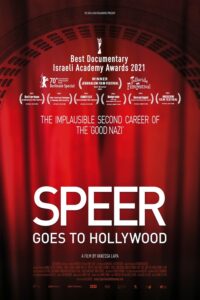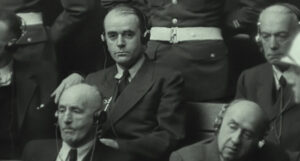Film Review: “Speer Goes to Hollywood” Tackles the Big Lie with (Mostly) Truth
Written by: Christopher Llewellyn Reed | November 7th, 2021

Speer Goes to Hollywood (Vanessa Lapa, 2021) 3 out of 4 stars.
In a film about Hitler’s architect, it seems more than appropriate for the subject to revolve around the manipulation of facts, given the Nazi leader’s early embrace of the “big lie” to sell his populist ideology. Albert Speer (1905-1981), who eventually became Germany’s Minister of Armaments and War Production, first rose to prominence redrawing the city plans for a future Berlin, before later using vast amounts of slave labor to further his projects, a reality he would soon minimize or deny. Director Vanessa Lapa (The Decent One) takes Speer’s falsehoods on directly in her newest documentary, Speer Goes to Hollywood, that revisits the early 1970s, shortly after the publication of his best-selling memoir, Inside the Third Reich, when Paramount Studios started pre-production on a movie adaptation of the book.
It’s a fascinating examination of deception, gripping even as Speer proves increasingly repellant; or charismatic, if you have a thing for duplicity. Speer is not alone in the game, joined as he is by budding screenwriter Andrew Birkin (brother of Jane and protégé of not one, but two prominent directors, Stanley Kubrick and Carol Reed). Together, they work on the script for a dramatic reenactment of Speer’s life that will never come to be (ABC would eventually release a four-hour miniseries of its own in 1982). Intercutting audio from the over 40 hours of 50-year-old recorded conversations with copious archival material and clever footage from period-appropriate films, Lapa creates an evocative portrait that constantly reminds us of the genocidal horrors of the past, allowing direct and indirect parallels to our own present to surface, as well.

Of particular interest are the many clips from the post-WWII Nuremberg trials, at the end of which Speer somehow escaped execution (unlike many of his peers), sentenced to 20 years in prison, instead. The court scenes present an array of faces as devoid of acknowledged culpability as one might hope never to see again. Flash-forward a quarter-century, and though Speer has now become a published confessor of Nazi sins, he still can’t quite admit to all of his own atrocities. Since everyone one around him, including young Birkin, appear to enable this behavior, it’s easy to understand why. He’s suave! He’s urbane! Leave him be … At least Reed, in the conversations we hear, keeps on pushing hard for his mentee to avoid the whitewashing his subject so obviously desires. When Birkin keeps on accommodating historical events to Speer’s desires, implying that actual facts don’t matter, Reed’s fears come into ever sharper relief.
In a stroke of either regrettable hubris or creative brilliance (of the art-imitating-life variety), it turns out that Lapa also engages in some sleight of hand, herself. It was with a bit of a shock that I noticed, after the initial ending title cards, as the final credits began to roll, the names of four voice actors listed, apparently incarnating what I thought were the real people I had just heard for 90 minutes. After a quick google search, I found a fellow critic’s review that discusses the matter, and then sent an email to the publicist.

Her reply explains that “the recordings were 50 years old, so the sound quality was very poor, also indicating that Lapa insists that “the sound recording is exactly the words and the intonations (and the accents/pronunciation) as on the original tapes.” Perhaps. However, a facsimile is not the original, no matter how much you may wish it were, and Lapa should, in my opinion, disclose her methods when she first introduces the recordings in her movie’s ninth minute. Still, that questionable cinematic decision notwithstanding, as a meditation on the seductive pull of all lies, big and small, Speer Goes to Hollywood delivers an engaging and bracing dose of (mostly) truth.

